Maharashtra – The Nurses Protest In Maharashtra has achieved a significant breakthrough as State Minister for Medical Education, Madhuri Misal, assured government nurses of arranging a meeting with Chief Minister Devendra Fadnavis to address their long-pending demands. This development comes following intensive demonstrations by healthcare workers seeking immediate attention to critical service-related issues.
The Nurses Protest In Maharashtra culminated in a major demonstration at Azad Maidan in Mumbai on Tuesday, where members of the Maharashtra Government Nurses Federation gathered to draw attention to various pressing concerns affecting the healthcare sector. The protest highlighted systemic issues that have been plaguing the state’s healthcare infrastructure for extended periods.
Background of the Healthcare Crisis
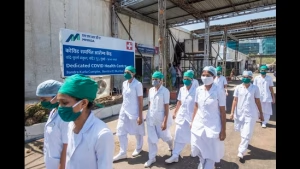
The Nurses Protest In Maharashtra emerged from mounting frustration among healthcare workers regarding deteriorating working conditions and stagnant career progression opportunities. The demonstration represents collective action by thousands of nurses who form the backbone of Maharashtra’s public healthcare system.
Healthcare professionals participating in the Nurses Protest In Maharashtra have been experiencing prolonged delays in recruitment processes, inadequate staffing levels, and substandard working conditions that compromise both patient care and professional satisfaction. These issues have created a crisis of confidence among nursing staff across the state.
The Nurses Protest In Maharashtra reflects broader challenges facing India’s healthcare sector, where nursing professionals often struggle with recognition, compensation, and career advancement opportunities despite their critical role in patient care and public health management.
Key Demands and Professional Concerns
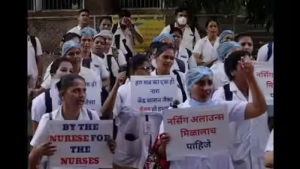
The Nurses Protest In Maharashtra centered around several critical demands that healthcare workers presented to the state government through their federation representatives. Immediate filling of vacant posts in hospitals emerged as the primary concern, with understaffing creating excessive workload pressures on existing personnel.
Pay scale improvements featured prominently in the Nurses Protest In Maharashtra demands, with nursing professionals seeking compensation packages that reflect their qualifications, responsibilities, and contributions to healthcare delivery. The current pay structure has been identified as inadequate compared to similar positions in other sectors.
Promotion opportunities and service condition improvements were also highlighted during the Nurses Protest In Maharashtra, with healthcare workers expressing concerns about limited career advancement prospects and lack of professional development support from government authorities.
Also Read: Jai Hind Camp New Delhi: Shocking Utility Cuts Spark Political Row
Recruitment Process Challenges
The Nurses Protest In Maharashtra addressed significant problems in the recruitment process that have affected aspiring healthcare professionals. Technical errors in online application systems have created barriers for eligible candidates seeking employment in government hospitals and healthcare facilities.
Minister Misal acknowledged these technical difficulties during discussions with Nurses Protest In Maharashtra representatives, recognizing that system failures have unfairly disadvantaged qualified applicants. The minister’s response demonstrates government awareness of administrative shortcomings affecting healthcare recruitment.
To address these concerns raised during the Nurses Protest In Maharashtra, the application deadline has been extended to July 14, ensuring that all eligible candidates receive fair opportunities to apply for nursing positions in government healthcare facilities.
Administrative Response and Reform Commitments
The Nurses Protest In Maharashtra has prompted immediate administrative action, with Minister Misal committing to comprehensive reforms in healthcare staffing and service delivery across the state. These commitments represent significant policy shifts in response to legitimate healthcare worker concerns.
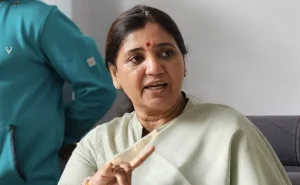

The government’s response to the Nurses Protest In Maharashtra includes promises to reconsider increments and allowances, providing clarity on job tenure security, and implementing regularization processes for existing nursing staff. These measures address fundamental employment concerns raised by healthcare professionals.
Additionally, the Nurses Protest In Maharashtra has catalyzed discussions about upgrading recruitment and training procedures in accordance with central guidelines, ensuring that Maharashtra’s healthcare system meets national standards for professional development and service delivery.
Political and Policy Implications
The Nurses Protest In Maharashtra has significant political implications, as healthcare worker satisfaction directly impacts public health outcomes and government credibility. The state administration’s response will influence public perception of the government’s commitment to healthcare infrastructure development.
The promised meeting with Chief Minister Fadnavis represents a high-level political engagement with healthcare worker concerns, elevating the issues raised during the Nurses Protest In Maharashtra to the highest levels of state government decision-making.
Healthcare Infrastructure Challenges
The underlying issues addressed by the Nurses Protest In Maharashtra reflect broader challenges in India’s healthcare infrastructure, where human resource management remains a critical concern. Adequate staffing levels are essential for maintaining healthcare quality and accessibility.
The protest highlights the need for systematic reforms in healthcare workforce planning, professional development, and compensation structures to ensure sustainable healthcare delivery across Maharashtra’s diverse geographic and demographic landscape.
Professional Recognition and Career Development
The Nurses Protest In Maharashtra emphasizes the importance of professional recognition for healthcare workers who provide essential services to society. Nursing professionals seek acknowledgment of their expertise, qualifications, and contributions to patient care and public health outcomes.
Career development opportunities, continuing education support, and professional advancement pathways are essential components of healthcare workforce retention and quality improvement strategies that the state government must address comprehensively.
Future Outlook and Expected Outcomes
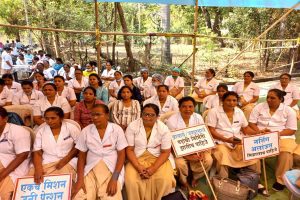

The success of the Nurses Protest In Maharashtra in securing high-level government attention suggests potential for meaningful reforms in healthcare workforce management. The promised meeting with the Chief Minister provides an opportunity for detailed policy discussions and commitment to specific timelines for implementation.
Healthcare worker satisfaction and retention will depend on the government’s ability to translate promises into concrete actions that address the fundamental concerns raised during the protest. The nursing community will closely monitor progress on these commitments.
Conclusion and Broader Significance
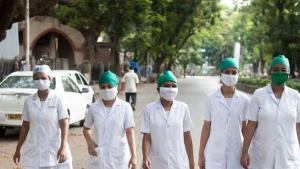
The Nurses Protest In Maharashtra represents a pivotal moment in the state’s healthcare policy landscape, with potential for significant improvements in working conditions, career prospects, and professional recognition for healthcare workers. The government’s response will set important precedents for healthcare workforce management across India.
The demonstration’s success in securing ministerial attention and promises of reform illustrates the power of collective action in addressing systemic issues affecting essential public services and professional healthcare delivery.

